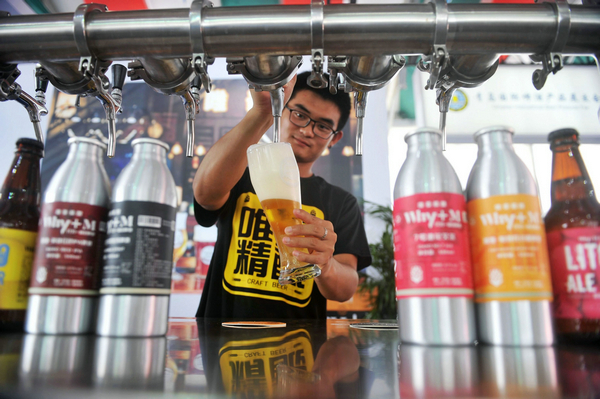 |
A staff member pours draft beer at Golden Beach Beer City in the West Coast New Area in Qingdao, Shandong province, during an annual beer festival in July 2019. YU FANGPING/FOR CHINA DAILY |
BEIJING-Designer Mu Yang likes to occasionally grab a beer after work while hanging out with friends, but he has a preference for good-quality craft beer. Therefore, he makes a conscious effort to pick out places offering such brews.
During a business trip in October, Mu visited Peiping Machine, a well-known craft beer bar in Beijing. "My favorite is stout, with dense foam, roasted aroma, and a hint of chocolate," says Mu.
"Craft and mass-produced beers taste completely different," he says. "Contrary to mass-produced ones, craft beers taste fresh, and this is the striking attribute for most drinkers."
Compared with ordinary industrial beer, craft beer's fermentation process is more traditional, with fewer industrial additives and exquisite and diversified tastes. For example, craft brewers choose to ferment beer in wine and whisky barrels to generate a unique flavor and aroma.
China has always been a huge consumer of beer, but preferences are shifting away from industrial beers to more premium and craft flavors. As a result, sales growth of cheaper beers has been on a decline in recent years, while demand for high-end beers is rising.
Li Wei, founder of Peiping Machine and former president of the Beijing Homebrewing Society, has witnessed the rapid growth of the Chinese craft beer market since he became engaged in the industry in 2012.
"When the association was established, there were only a dozen members. It was difficult to buy craft beer and most were imported with a price as high as more than 200 yuan ($30) a can," Li says.
"But now the association has more than 4,000 members, and the price of craft beer has dropped to tens of yuan a can," says Li.
According to statistics from the Beijing Homebrewing Society, Beijing had only 30-plus stores in 2013 that sold fine craft beer. The number had increased to more than 90 in 2014. Currently, the city has more than 6,000 bars and restaurants selling craft beer.
The booming market for craft beer has spawned various beer festivals and exhibitions. Last year, several craft beer festivals were held in cities including Shanghai and Hefei. Beijing Brew 2020, held in September, attracted more than 8,000 visitors and over 120 industrial chain enterprises.
Zheng Miaohui has 15 years of experience in beer production equipment and technology. He is now the Asia-Pacific director of a company producing heat exchangers, which are mainly used for the heating, cooling and sterilization of beer.
"In recent years, most of the increase in my company's orders came from China's craft beer industry," says Zheng. "Some big brewers have shut down their industrial beer factories and expanded their craft beer production lines or acquired craft beer brands."
As bars and restaurants in large cities like Shanghai and Beijing are experiencing an influx of customers, Zheng's team has started to provide them with a sales system for craft beer.
Craft beer accounted for 25 percent of total beer sales in the United States in 2019, statistics from the US Brewers Association show. However, China's craft beer sales accounted for only 2.4 percent of the overall beer market, according to the Qianzhan industry research institute.
Compared with the US market, China's craft beer has great room for growth, the think tank says.
"The popularity of craft beer isn't a short-term trend, but an essential consumption upgrade," says Li. "People are eager to pursue the classic taste of beer and their taste for premium beer is growing."